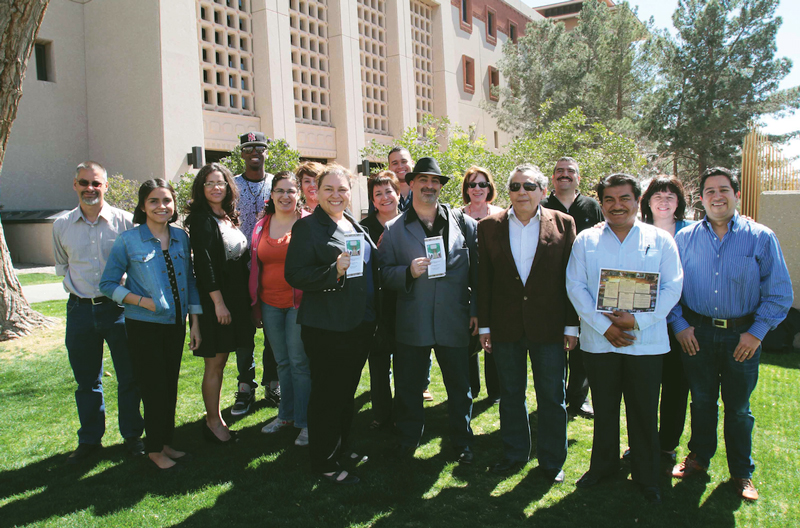By Daniel Perez, UTEP News Service

What started as an academic collaboration between UTEP and a university on Mexico’s Yucatán Peninsula has turned into a transnational, interdisciplinary research mission to assist Maya immigrants in San Francisco.
Following several brainstorming sessions between representatives from The University of Texas at El Paso and the Universidad Autonoma de Yucatán (UADY), the Mexican educators said they wanted social scientists, health experts and educators to develop ways to promote health services to Maya immigrants living in U.S. urban communities. This has been a growing need in the U.S. and the Yucatán, where more Maya deportees have returned to their communities with social and medical issues.
“The Mayas are different after having lived in the U.S. They seem almost like foreigners coming home,” said Fidencio Briceno Chel, Ph.D., professor, researcher and coordinator of linguistics at the National Institute of Anthropology and History in Merida, Yucatán. “Their rural communities are not prepared to handle these changes.”
“We’re connected by an opportunity to do meaningful research. We’re using technology to make an impact. We’re developing materials that are culturally and linguistically relevant, and collecting these ideas and making them accessible. The key is to understand the needs of the people and connect with them.” – Guillermina “Gina” Núñez-Mchiri, co-principal investigator
Seeing the broad implications of this project, Judith H. Munter, Ph.D., UTEP associate professor of teacher education, reached out to colleagues from UTEP’s departments of social work, and sociology and anthropology. Her UADY counterpart, Miguel Guemez, Ph.D., director of the Department of Social Sciences, assembled his own interdisciplinary team.
The universities also brought in Asociacion Mayab, a nonprofit community center in San Francisco that provides health services to approximately 20,000 undocumented Mexican immigrants of Maya descent. Mayab stands for Maya Yucateca del Area de la Bahai.
Principal investigators Munter and Guemez obtained a $42,000 grant from PIMSA, a University of California, Berkeley, Latino health outreach organization, to start Project Bridging Worlds in April 2013.
“UTEP is positioned as a bridge,” Munter said. “Bridging Worlds aims to serve as a model for the development of binational approaches to health education focused on health promotion for an indigenous diaspora in the U.S.”
The universities’ researchers have used such health promotion approaches as Photovoice, YouTube and community exhibits to develop and test a series of modules to enhance access to health resources at Mayab. The Yucatan partners also have helped train the on-site providers.
The modules use culturally relevant scenarios and vignettes that suggest ways immigrants can deal with the stresses of a new country that could lead to depression, drug addiction, diabetes, high blood pressure and poor diet. They are written in English and Spanish and then translated into the Yucatec Mayan language.
Joining Munter as co-principal investigators on the UTEP team are Guillermina “Gina” Núñez-Mchiri, Ph.D., associate professor of anthropology; Ernesto Castañeda, Ph.D., assistant professor of sociology; and Eva M. Moya, Ph.D., assistant professor of social work. They are supported by eight students – from undergraduates to doctoral candidates – from the colleges of Education, Engineering, Health Sciences and Liberal Arts.
“We’re connected by an opportunity to do meaningful research,” Núñez-Mchiri said. “We’re using technology to make an impact. We’re developing materials that are culturally and linguistically relevant, and collecting these ideas and making them accessible. The key is to understand the needs of the people and connect with them.”
Núñez-Mchiri said the study’s human element has brought out the best of UTEP’s student researchers. Their ability to improve someone’s quality of life has boosted their confidence and self-esteem.
Among those involved is Blanca Diaz, who earned her bachelor’s in psychology and philosophy from UTEP in 2013 and expects to begin her graduate work in counseling and rehabilitation at the University in fall 2014. As a former undocumented immigrant, she empathized with the plight of the Mayas.
Diaz, a Juárez native who has lived in the United States since age 14, got a permit to work in the United States due in part to the DREAM (Development, Relief, and Education for Alien Minors) Act and DACA, which stands for Deferred Action for Childhood Arrivals. She said she understands the struggles of undocumented residents as they seek an education and health care in America. She dealt with it when her father needed treatment for a serious illness.
“It feels good to be able to help others who don’t speak English or Spanish,” said Diaz, who helped present some Bridging Worlds research results at the annual meeting of the Society for Applied Anthropology in Albuquerque in March 2013. Her research module centered on depression and other mental health issues that impact immigrant communities. “It’s exciting to know that I was able to take a bad experience and turn it into something positive.”
The initial modules are having a positive impact among those who use Mayab, said Alberto Perez Rendon, M.D., Asociacion Mayab director and board member. He said the center was grateful for the opportunity to collaborate with the two universities that lent their credibility and helped build its academic and financial resources.
Munter said she and the other researchers plan to go after a larger grant that will allow them to grow their research to include more faculty and students. She added that the initial grant has led to more serious discussions to develop formal agreements between UTEP, UADY and Universidad Modelo, another important Mexican university in the Yucatán Peninsula.